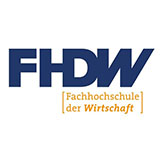Introduction
Fachhochschule der Wirtschaft (FHDW), or University of Applied Sciences for Economics, is a private non-profit higher education institution located in North Rhine-Westphalia, Germany, focusing on teaching and research in the fields of economics and business administration, economic informatics, etc.
Overview
Student size: There are about 2,000 students studying at its five campuses in Paderborn, Bielefeld, Bergisch Gladbach, Mettmann and Marburg.
Course settings: It offers undergraduate and master's degree programs in multiple professional fields, including dual-system and in-service courses in business administration, international business, economic informatics, control and financial management, procurement and logistics management, etc.
History and establishment time **
FHDW was established in 1992 and is one of the earliest private universities of applied sciences in North Rhine-Westphalia.
School strength
Faculty strength: Teachers not only have solid professional knowledge, but also have rich practical experience, and can provide students with teaching guidance combining theory and practice. The school focuses on close communication between teachers and students. Students can fully interact with teachers in small study groups and receive personalized learning support.
Teaching quality: The practice-oriented teaching model enables students to accumulate practical work experience during the learning process and improve their employment competitiveness. About 90% of graduates can find stable jobs in enterprises after graduation.
Research level: Although there are no large-scale scientific research projects in the traditional sense, a series of research combined with the actual needs of enterprises has been carried out in application fields such as economics and business administration, providing intellectual support for local economic development, and also providing a basis for the updating and optimization of teaching content.
Institutional nature
Private non-profit higher education institution.
Educational philosophy
Emphasis on the combination of theory and practice. Through the dual-system teaching model, the university learning stage is closely combined with the practical stage in the cooperative enterprise, so that students can exercise practical operation ability and problem-solving ability while acquiring knowledge, laying a solid foundation for future career development.
Key laboratories and disciplines
Key disciplines: Business management and economic informatics are the key disciplines of FHDW. The school has opened a wealth of dual-system and in-service undergraduate and master's courses in these disciplines. The courses are closely combined with market demand and focus on cultivating students' professional skills and practical ability.
Key laboratories: No key laboratories in the traditional sense were found in the school, but the school has established cooperative relations with many enterprises. These enterprises can be regarded as important places for students to practice, similar to a broad practice "Laboratory" provides students with the opportunity to apply theoretical knowledge to practical work.
Department
The school has not found a clearly defined department, but from the perspective of professional settings, it is mainly concentrated in related fields such as economics and business administration, economic informatics, etc. These majors together constitute the school's teaching and research system.
Ranking
According to the 2024 ranking data of 4icu.org, FHDW ranks 253rd in Germany and 4676th in the world.
Expense
Tuition fees: Specific tuition fees vary depending on the major and course type. For example, the tuition fee for part-time undergraduate courses starts at 1980 euros per semester, the tuition fee for dual-system undergraduate courses starts at 1650 euros per semester, and the tuition fee for master's courses starts at 2400 euros per semester.
Living expenses: In North Rhine-Westphalia, students' monthly living expenses are about 800-1000 euros, including expenses for accommodation, food, transportation, learning materials, etc.
Campus
Campus location: The main campus is located in Paderborn, which has a population of 50,000-249,990. It is a small city with both urban and rural characteristics, providing students with a relatively quiet learning environment and convenient living facilities. In addition, the school has branches in Bielefeld, Bergisch Gladbach, Mettmann and Marburg.
Teaching facilities: The school is equipped with modern teaching facilities, including libraries, computer laboratories, multimedia classrooms, etc., which provide good conditions for students' study and research.
Living facilities: There are student dormitories, canteens, sports facilities, etc. on or around the campus to meet students' daily needs and promote their all-round development.
-

Heidelberg University
-

University of Freiburg
-

University of Jena
-

University of Marburg
-

University of Rostock
-

University of Halle-Wittenberg
-

University of Bayreuth
-

Leipzig University
-

University of Tübingen
-

Humboldt University of Berlin
-

Mesoamerican University
-

Istmo University
-

Mariano Galvez University of Guatemala
-

Regional University of Guatemala
-

Galileo University
-

Francisco Marroquín University
-

Rafael Landívar University
-

University of the Valley of Guatemala
-

University of San Carlos of Guatemala
-

Technological Institute of Tlaxcala Plateau
-

Golfo University
-

Technological University of South Sonora
-

Technological University of Huejotzingo
-

Tizimín Institute of Technology
-

Chilpancingo Institute of Technology

